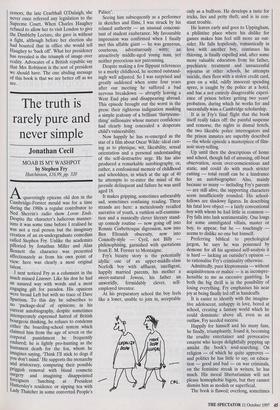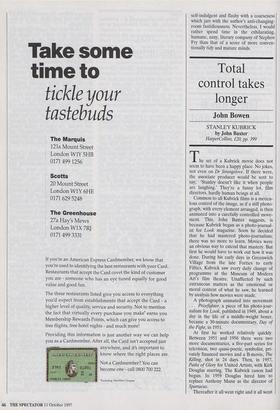The truth is rarely pure and never simple
Jonathan Cecil
MOAB IS MY WASHPOT
by Stephen Fry Hutchinson, £16.99, pp. 320 by Stephen Fry Hutchinson, £16.99, pp. 320 Aquaveringly epicene old don in the Cambridge-Forster mould was for a time during the 1980s a regular contributor to Ned Sherrin's radio show Loose Ends. Despite the character's ludicrous manner- isms it was some time before I realised he was not a real person but the imaginary creation of an ex-undergraduate comedian called Stephen Fry. Unlike the academics Pilloried by Jonathan Miller and Alan Bennett the character was presented affectionately as from his own point of view: here was clearly a most original talent.
I next noticed Fry as a columnist in the much missed Listener. Like his don he had an assured way with words and a most engaging gift for paradox. His opinions were broad Left but with no trace of Dave Spartism. To this day he subscribes to no 'package-deaf of opinions; in his current autobiography, despite sometimes Intemperately expressed hatred of British bourgeois thinking, he refuses to condemn either the boarding-school system which claimed him from the age of seven or the corporal punishment he frequently endured; he is lightly pro-hunting as the humanest death for the fox, whom he Imagines saying, 'Think I'll stick to dogs if You don't mind.' He supports the monarchy and aristocracy, comparing their possible priggish removal with bland cosmetic surgery and imagining disappointed foreigners 'lunching at President ilattersley's residence or sipping tea with LadY Thatcher in some converted People's
Palace'.
Seeing him subsequently as a performer in sketches and films, I was struck by his relaxed authority — an unusual concomi- tant of student exuberance. My favourable impression was confirmed when I finally met this affable giant — he was generous, courteous, adventurously witty; an attractively middle-aged young man, yet neither precocious nor patronising.
Despite making a few flippant references to a murky childhood, he seemed outstand- ingly well adjusted. So I was surprised and greatly saddened when some four years after our meeting he suffered a bad nervous breakdown — abruptly leaving a West End play and disappearing abroad. This episode brought out the worst in the press: their righteous indignation masking a simple jealousy of a brilliant `thirtysome- thing' millionaire whose mature confidence had clearly long concealed a desperate child's vulnerability.
Now happily he has re-emerged as the star of a film about Oscar Wilde: ideal cast- ing as to physique, wit, likeability, sexual orientation and a personal understanding of the self-destructive urge. He has also produced a remarkable autobiography, or, rather, a confessional memoir of childhood and schooldays, in which at the age of 40 he attempts to re-enter the mind of the juvenile delinquent and failure he was until aged 18.
It makes gripping, sometimes unbearably sad, sometimes confusing reading. Three strands are here: a meticulously recalled narrative of youth, a ruthless self-examina- tion and a manically clever literary stand- up comedy routine — now going off into Ronnie Corbettesque digression, now into Ben Eltonish obscenity, now into Connolly-style — Cyril, not Billy — philosophising, garnished with quotations from E. M. Forster to Montaigne.
Fry's bizarre story is the potentially idyllic one of an upper-middle-class Norfolk boy with affluent, intelligent, happily married parents, his mother a sweet-natured Jewess, his father an unworldly, formidably clever, self- employed inventor.
At his preparatory school the boy feels like a loner, unable to join in, acceptable only as a buffoon. He develops a taste for tricks, lies and petty theft, and is in con- stant trouble.
He leaves early and goes to Uppingham, a philistine place where his dislike for games makes him feel still more an out- sider. He falls hopelessly, romantically in love with another boy, continues his thieving, is finally expelled and, after some more valuable education from his father, psychiatric treatment and unsuccessful sojourns at other schools, he attempts suicide, then flees with a stolen credit card, goes on a wild, oddly innocent spending spree, is caught by the police at a hotel, and has a not entirely disagreeable experi- ence of prison before getting two years' probation, during which he works for and successfully wins a Cambridge scholarship.
It is in Fry's final flight that the book itself really takes off: the painful suspense and remorse, the nights in dismal hotels, the two likeable police interrogators and the prison inmates are superbly described — the whole episode a masterpiece of film- noir story-telling.
Up until then the descriptions of home and school, though full of amusing, off-beat observation, seem over-conscientious and static, and could do with much stricter cutting — total recall can be a hindrance for an autobiographer. Also, mainly because so many — including Fry's parents — are still alive, the supporting characters seem insufficiently rounded. His school- fellows are shadowy figures. In describing his fatal love object — a fairly conventional boy with whom he had little in common — Fry falls into lush sentimentality. One longs for some unmitigated villain, master or boy, to appear, but he — touchingly — seems to dislike no one but himself.
Preferring biblical to psychological jargon, he says he was possessed by demons: for all his agonised self-analysis it is hard — lacking an outsider's opinion — to rationalise Fry's criminality otherwise.
Admittedly, pure kleptomania — without acquisitiveness or malice — is as incompre- hensible to me as excessive gambling. In both the big thrill is in the possibility of losing everything. Fry emphasises his near joy at being finally led off in handcuffs.
It is easier to identify with the imagina- tive adolescent, unhappy in love, bored at school, creating a fantasy world which he could dominate: above all, even as an outlaw, Fry needed success.
Happily for himself and his many fans, he finally, triumphantly, found it, becoming the erudite entertainer and provocative essayist who keeps delightfully popping up amidst the book's soul-searching. On religion — of which he quite approves — and politics he has little to say; on educa- tion — good and bad — on war criminals, on the feminine streak in writers, he has much. His moral libertarianism will not please homophobic bigots, but they cannot dismiss him as modish or superficial.
The book is flawed; overlong, sometimes self-indulgent and flashy with a coarseness which jars with the author's anti-changing- room fastidiousness. Nevertheless, I would rather spend time in the exhilarating, humane, zany, literary company of Stephen Fry than that of a score of more conven- tionally tidy and mature minds.



















































































 Previous page
Previous page